Unit 2 What is happiness to you? Grammar(江苏省苏州市平江区)
文档属性
| 名称 | Unit 2 What is happiness to you? Grammar(江苏省苏州市平江区) | 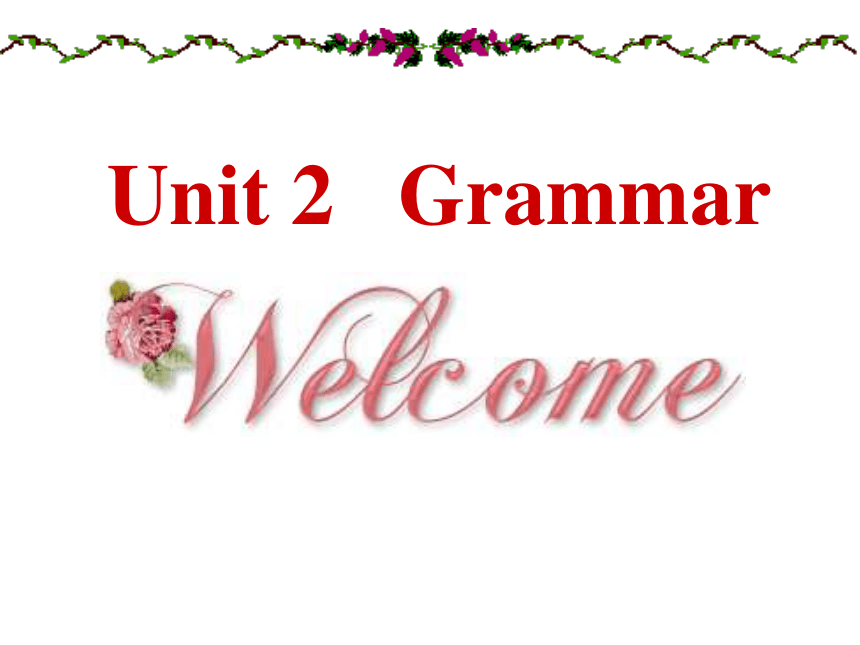 | |
| 格式 | rar | ||
| 文件大小 | 2.2MB | ||
| 资源类型 | 教案 | ||
| 版本资源 | 牛津译林版 | ||
| 科目 | 英语 | ||
| 更新时间 | 2008-10-10 21:09:00 | ||
图片预览


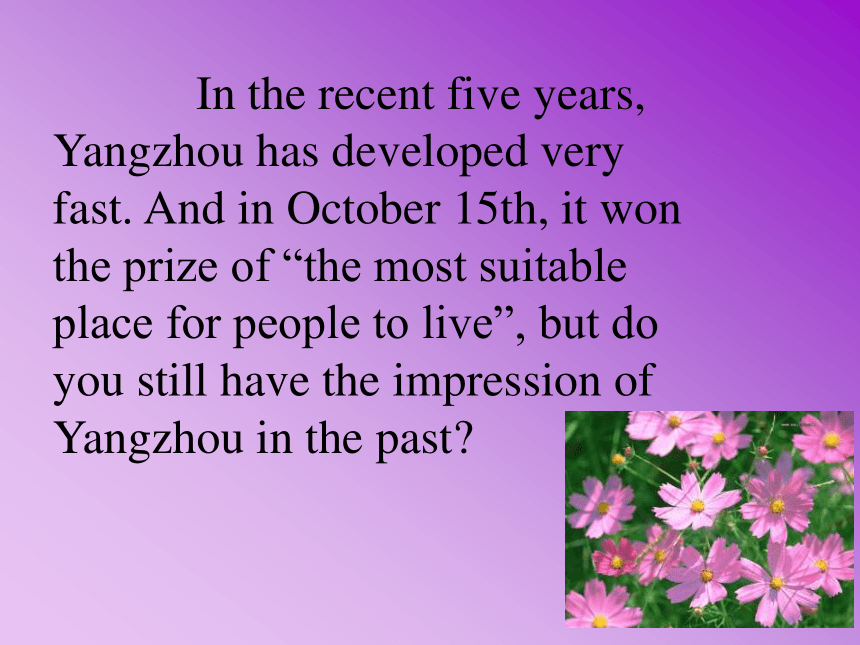
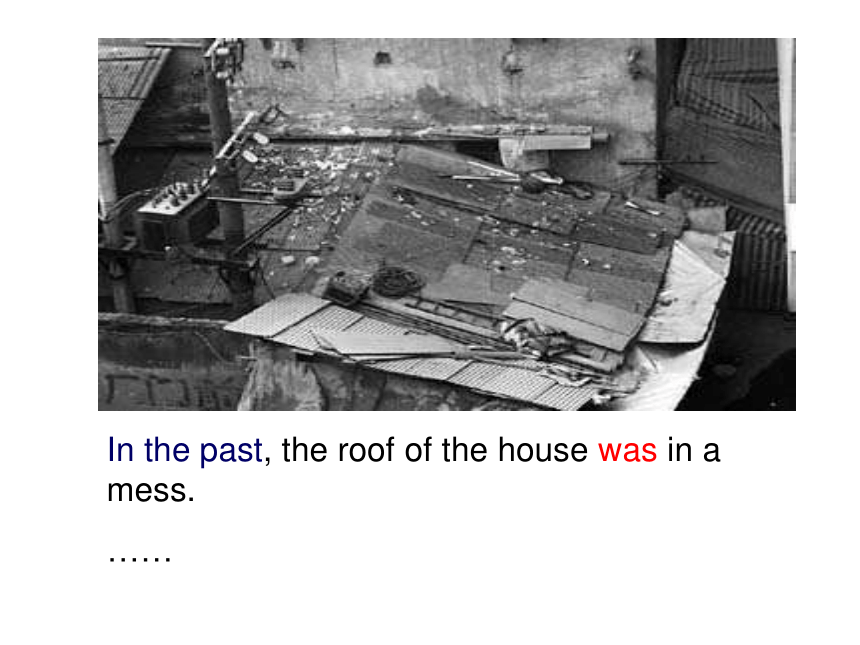
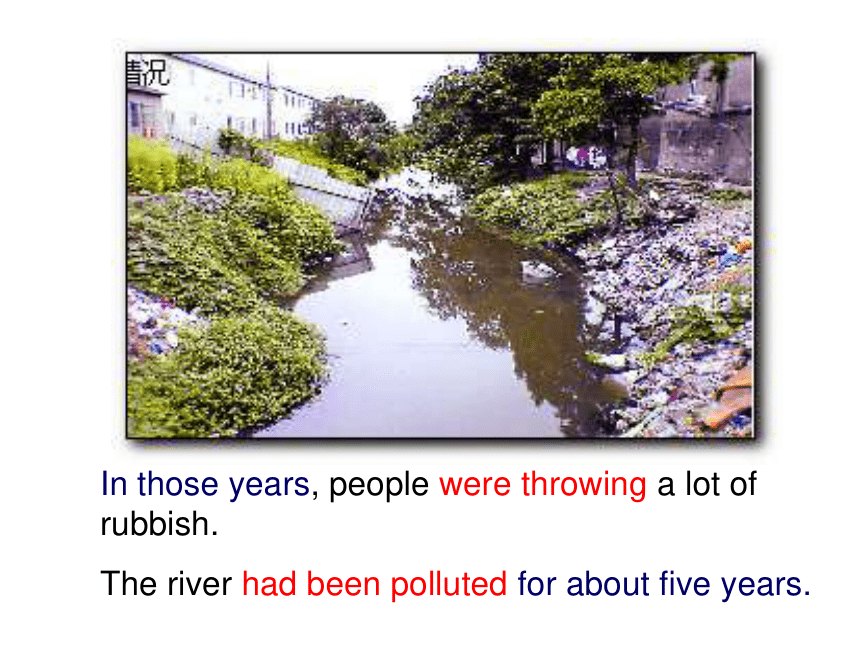





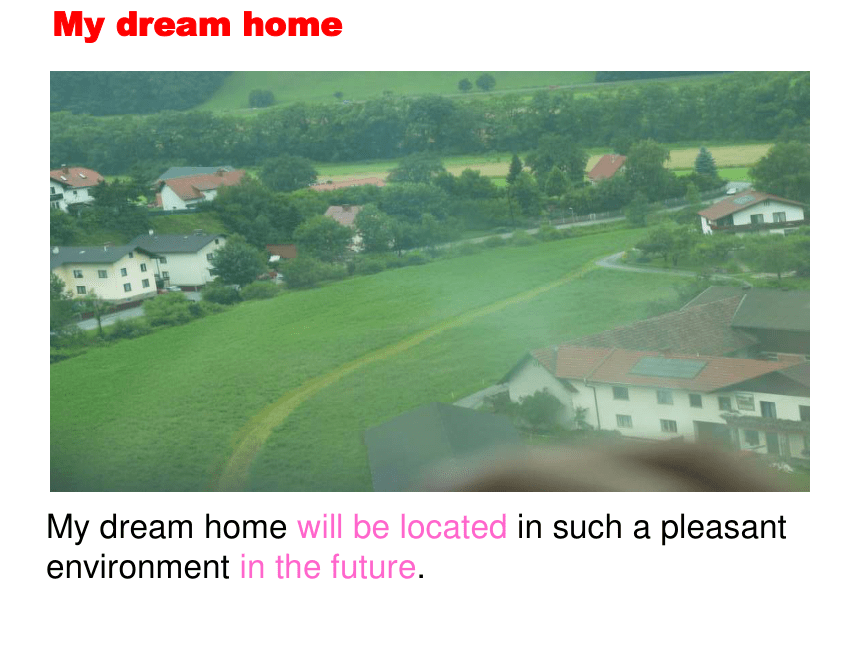
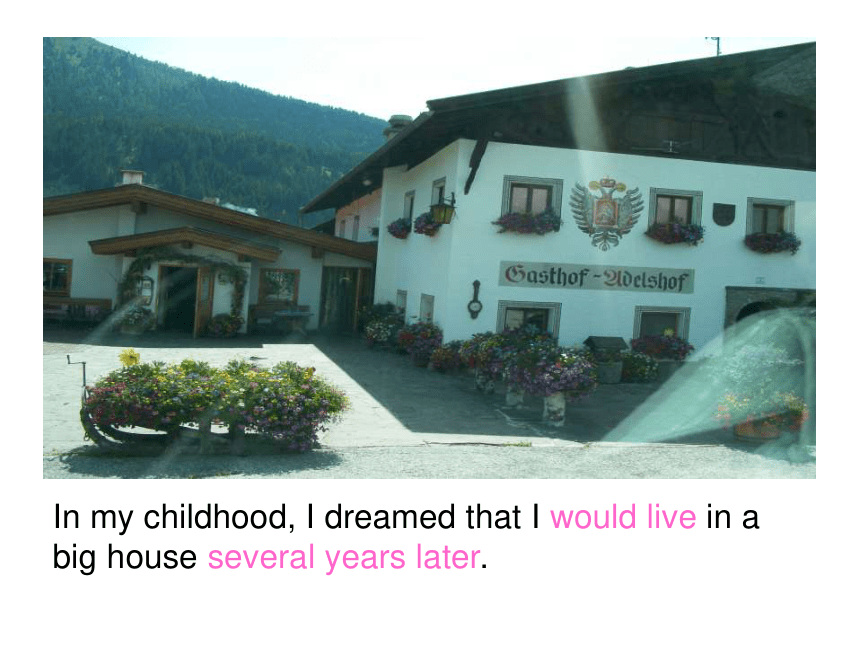
文档简介
课件50张PPT。Unit 2 Grammar 俄罗斯当地时间10月4日上午9时,金碧辉煌的喀山市城市大厦的市政大厅,2006世界人居日庆典暨“联合国人居奖”颁奖仪式在此举行。联合国副秘书长、联合国人居署执行主席安娜·蒂贝琼卡宣布:“中国扬州获得了2006年联合国人居奖!” In the recent five years, Yangzhou has developed very fast. And in October 15th, it won the prize of “the most suitable place for people to live”, but do you still have the impression of Yangzhou in the past?In the past, the roof of the house was in a mess.
……In those years, people were throwing a lot of rubbish.
The river had been polluted for about five years.But we are very glad to see many changes have happened in Yangzhou.
Let’s enjoy its beauty.Can you imagine Yang Zhou's future?My dream home will be located in such a pleasant environment in the future.My dream homeIn my childhood, I dreamed that I would live in a big house several years later.I imagine, my wife and I will be walking in the beautiful place on the morning of the future. It’s romantic, isn’t it? 一般过去时的用法
1)表示过去发生的,和现在没有联系的动作或状态。
1.----Look! Someone has spilt (溢出)coffee on the carpet.(地毯)
----Well , it _____ me.
A. isn’t B. wasn’t C. hasn’t been D. hadn’t been
2.----I’ve bought a box of chocolates for our daughter. ---Oh, how good a dad! But she doesn’t like sweet things. _____ that?
A. Don’t you know B. Haven’t you known
C. Didn’t you know D. Hadn’t you known
3.----Was Mary in the office when you arrived there?
------Yes , but she _____soon afterwards.
A. had left B. left C. would leave D. will leave 一般过去时的用法
2)注意:一般过去时与过去进行时的区别:
一般过去时表示一个完成的动作,而过去进行时则表示一个没有完成且正在进行的动作。
I wrote a letter this morning. 今天上午我写了一封信。(信已写完)
② I was writing a letter this morning. 今天上午我在写一封信。(正在写,不一定写完)
1.----Has Tommy finished his job yet?
----I have no idea of it ; he ____ it this morning.
A. was doing B. had been doing C. has done D. did
2.As she ____ the newspaper, Granny ______asleep.
A . read, was falling B. was reading ,fell C. was reading, was falling D. read ,fell
3.All morning as she waited for the medical report from the doctor, her nervousness_____.
A. has grown B. is growing C. grew D. had grown
4.---I’m sorry , I shouldn’t have been so rude to you.
-----You _____ your temper but that’s OK.
A. have lost B. had lost C. did lose D. were losing. 过去进行时 1.表示 过去某一时间正进行的动作 。通常有时间状语(从句),或由上下文表示。
1.---Hey ,look where you are going?
-----Oh, I’m terribly sorry ._______.
A. I’m not noticing B. I don’t noticing
C. I haven’t noticing D. I was n’t noticing
2.-----Hey ,what did I say?
-----I _________.
A. I’m not listening B. I was not listening C. I don’t listened D. I didn’t listen2. 表示 过去某一阶段一直在进行的动作,但这个动作可以完,也可以不一定完成。
③-----Why didn’t you join us last night?
-----I _____ the live programs on the war between Iraq and the States.
A. watched B. was watching C. had watched D. have been watching
④----Why weren’t you at the meeting?
----I ____ for a long –distance call from my father in Australia.
A. waited B. was waiting C. had waited D. have been
⑤ Good heavens ! There you are ! We ____ anxious about you . We ____ you back much earlier all through the night.
A. are , expect B. were, had expected
C. will be , are expecting D. have been , were expecting
⑥ ----You look tired.
----Yes. I non stop ____ until twelve o’clock.
A. am working B. was working C. has worked D. had worked
3. 在简单句中有at that time, then , this time yesterday / last week, at 10 o’clock last night 等具体的时间状语用过去进行时态。
I first met Lisa three years ago . She ____ at a radio shop at the time.
has worked B. was working
C. had been working D. had worked
特别注意:
与always连用,表示感彩。
My brother was always losing his key.1. — Look! How wonderful my car is! Oh, Jack. What are you thinking about? Don’t you like it?
— I’m sorry I ______ any remark about it in time. I certainly think it’s smart.
A. wasn’t making???? B. don’t make???
C. won’t make???????? D. didn’t make
2. To find the street where I lived in my childhood is no easy task because the city ______ so rapidly all these years.
A. is changing???????? B. has changed??????
C. will have changed???????? D. will change
3. He ______ quite well, but he hasn’t had time to swim since this summer.
A. will swim?????? B. have swum??? C. swam??????????? D. swims
4. Jimmy said that he would come to pick me up, but he ____by now.
A. hasn’t turned up???? B. doesn’t turn up????
C. won’t turn up???????? D. hadn’t turned up5. I’m terribly sorry for being late, but I _____ the wrong bus.
A. catch????????? B. had caught?????? C. caught?????????????D. catching
7. The truth, sir, is that the old man _______ across the road when my car hit him.
A. was to walk???????? B. had been walking????
C. walked?????????? D. was walking
8. I really don’t think Rose will be upset, but I will go and see her in case she _____.
A. is?????????????????? B. does?????????? C. will be??????????????D. has been
9. The computers made by our company sell best, but several years ago no one could have imagined the role in the markets that they _________.
A. were playing?????????? B. were to play????
C. had played???????????? D. played10. — Kate is in hospital.
— Oh, really? I _______. ________ visit her.
A. didn’t know; I’ll go and?????? B. don’t know; I’ll go and
C. don’t know; I’m going to???????? D. didn’t know; I’m going to
11. — Where _______ the guidebook? I can’t see it anywhere.
— I _______ it right here, but now it’s gone.
A. did you put; have put???????????? B. had you put; have put
C. have you put; put?????????????????? D. were you putting; put
14. — Do you live in this city?
— No, we ______ it for holidays.
A. just visit???? B. just visited?? C. are just visiting?? D. have visited
15. — How is the old man now?
— Sorry, he ______ though they did all they could to save him.
A. was dead????????B. had died?????? C. has been dead?????? D. died16.The lake will be further polluted unless some measures ______.
A. will be taken???? B. are taken?????C. were taken?? D. had been taken
17. I’m afraid it will be two months ______.
A. when I come back?? B. when I’ll come back??
C. before I come back?? D. before I’ll come back
18.The workers _____ busily when the boss came to look for something he ______ in the office.
A. had worked, had left?? B. were working ; had left
C. working ; had left?? D. had worked; left
19.The notice ______ “No smoking”.??
A. is told???? B. reads?????????? C. tells?????? D. is read过去完成时 1表示在过去某一时刻或动作之前已经完成了的动作,即“过去的过去”。
请记住:
by the end of +过去时间
be the time +从句(用一般过去时)引导的句子或主句用过去完成时)
①The film had already begun when I got there.
②They had left before I returned.
③We had finished the work by last month( by the time he came.)2 表示由过去某一时间开始,一直延续到过去另一个时间的动作或状态。
I had been at the bus stop for 20 minutes when a bus finally came.
3 用于hardly …when ;no sooner …than …(一….就…)等句子中。
Hardly had we arrived when she started complaining.
4 hope ,think expect ,intend ,mean ,suppose ,want ,imagine等,用于过去完成时,表示过去未实现的希望或意图。
I had hoped to be able to take my seat in all this noise without being found.
我本希望能乘着这些噪音不被发现地坐到位置上。(但实际上未实现)5 It is the first time +从句(从句用现在完成时);
It was the first time +从句(用过去完成时)。
It is the first time that I’ve been here.
It was the first time that he had ever spoken to me in such a tune.
6 用于对过去假设的虚拟语气中的从句。
If I had known your telephone number yesterday, I would have telephoned you .1. The old man _____ two days after he had been sent to hospital. ?
A. died B. would die C. had died D. has died ?
2. Old McDonald gave up smoking for a while, but soon ______ to his old ways. ?
A. returned B. returns C. was returning D. had returned ?
3. I _____ my son _____ a doctor, but he wasn’t good enough at science. ?
A. hoped; would become B. had hoped; would become ?
C. had hoped; will become D. hope; will become ?
4. I _____ to take a good holiday this year, but I wasn’t able to get away. ?
A. hope B. have hoped C. had hoped D. hoped ?
5. Helen _____ her key in the office so she had to wait until her husband _____ home.
A. has left; comes B. left; had come
C. had left; came D. had left; would come ? 一般将来时1 .一般将来时表示计划、打算、企图做某事或来注定要发生的事情。
2 .表示将来时的四种形式
①will /shall +动词原形
②be going to do
③be about to do(正要干什么)
④be to do ① be going to 有很强的计划性,打算干什么,而will表示谈话时临时决定的意图,具有临时性和偶然性。
----The telephone is ringing.
----I _____ answer it.
A. will B. am going to C. am to D. am about to
---Alice, why didn’t you come yesterday?
---I _____, but I had an unexpected visitor.
A. had B. would C. was going to D. did
②be going to 可用来表达某种迹象要发生的事。而will 不能表示
Look at the clouds! It’s going to rain.3. be to和be going to
①表示约定、计划或职责、义务要求即将发生的动作。
②be to do 安排将要干什么,有很强的计划性,有时=be going to
be to 表示客观安排或受人指示而做某事.
be going to 表示主观的打算或计划。
I am to play football tomorrow afternoon.
I'm going to play football tomorrow afternoon.
4.be about to do 表示“正要干什么…”,
表示即将发生的动作,不与表示将来的时间状语连用。
常与when 连用,when 此时意思: 就在这时,是并列连词
构成句型: …be about to do …when….
I was about to leave when it rained.
特别注意
(1)一般现在时表示将来,特别用于车、船、飞机等时刻表中安排好的。
The plane leaves tomorrow.(尽管有tomorrow, 但没有will ,be going to )
(2)某些瞬间动词“go, come, arrive ,leave ,start, begin, fly, take ”等用现在进行时表示将要发生的动作。
I’ve won a holiday for two to Floria. I ______my mum.
A. am taking B. have taken C. take D. will have been 几种时态的替代问题
A:一般现在时代替将来时 :
除了在时间、条件、让步状语从句中用一般现在时代替将来时外,表示现在已安排好的未来事项,行程等活动也用一般现在时来代替将来时。如: The museum opens at ten tomorrow. 博物馆明天10点开门。(实际上每天如此。)
B:一般现在时代替完成时:
句型 “It is … since…”代替“It has been … since …” It is (= has been) five years since we last met
C:一般现在时代替进行时:
在全部倒装句中都用一般现在时代替现在进行时。如:
Look, here comes Mr. Li. 祈使句中的动词问题
高考题点击:
1. _____ it with me and I’ll see what I can do. (98 N)
A. When left B. Leaving C. If you leave D. Leave
2. _____ some of this juice --- perhaps you’ll like it.
(2000 北京春季)
A. Trying B. Try C. To try D. Have tried
3. _____ at the door before entering, please. (01 北京春季)
A. knocked B. To knock C. Knocking D. Knock
4. _____ blood if you can and many lives will be saved.
(2001上海)
A. Giving B. Give C. Given D. To giveDBDB现在时态
高考题点击:
Months ago we sailed ten thousand miles across this open sea, which ___ the Pacific, and we met no storms. (05辽宁卷)A.was called ? B.is called?
C.had been called ? D.has been called
2. I _____ ping-pong quite well, but I haven’t had time to play
since the new year. (2001 N)
A. will play B. have played C. played D. play
BD说明:本题的干扰源为上下文的过去时,但“被称为太平洋”是客观现状,只能用一般现在时。说明:常识告诉我们,一个人一旦获得某种技能,一般是不会在短期内失去的,所以需用一般现在时。3. Since I won the big prize, my telephone hasn't stopped ringing.
People _____ to ask how I am going to spend the money.
(05湖南卷)
A. phone ? B. will phone ? C. were phoning D. are phoning
4. Selecting a mobile phone for personal use is no easy task because technology _____ so rapidly. (2001 N)
A. is changing B. has changed
C. will have changed D. will change
说明:自从我赢了大奖,人们不停地打电话来问我将怎样使用这笔钱。此处的 are phoning 表示“不停的打电话”。说明:选择移动电话难的原因是由于科技正在飞速发展,所以要用现在进行时;况且进行时态常给人一种情感上的描述,表示说话者的一种“感慨、赞赏、愤怒、斥责”等。DA5. _____ my sister three times today but her line was always
busy. (05北京春季)
A. I’d phoned B. I’ve been phoning
C. I’ve phoned D. I was phoning
6. --- You haven’t been to Beijing, have you?
--- _____. How I wish to go there! (98 N)
A. Yes, I have B. Yes, I haven’t
C. No, I have D. No, I haven’t
说明:此题的干扰源是后面的 was busy。今天打了三次电话是用来表示结果的,只能用现在完成时;而每次她都占线是表示过去的动作,所以用一般过去时。说明:从补充的句子 “How I wish to go there!”可知“我”没到过北京。CD7. --- Hi, Tracy, you look tired.
--- I am tired. I _____ the living room all day. (98 N)
A. painted B. had painted
C. have been painting D. have painted
8. Now that she is out of a job, Lucy______ going back to
school, but she hasn’t decided yet. (04北京)
A had considered B has been considering
C considered D is going to consider
说明:这句话的意思是“我一整天都在刷起居室”,现在完成进行时表示从过去开始的一个动作一直持续到现在,而且还在进行当中。强调的是“一直在做”。CB说明:她“一直在考虑返校”是现在完成进行时,“还没作决定”是现在的结果。过去时
高考题点击:
1. --- Nancy is not coming tonight.
--- But she _____! (98 N)
A. promises B. promised C. will promise D. had promised
2. My uncle _____ until he was forty-five. (2000 上海)
A. married B. didn’t marry
C. was not marrying D. would marry说明:Nancy 答应要来这个动作应该发生在过去,是过去作出的承诺。说明:until 用在肯定句中时,主句的动词必须是延续性动词,表示该动作一直持续到 until 后的时间为止;短暂性动词只能用在否定句中,表示直到此时该动作才开始。本题中 marry 是短暂性动词,所以只能用在否定句中。BB3. --- You haven’t said a word about my new coat, Brenda. Do
you like it? (N2002)
--- I’m sorry I _______ anything about it sooner. I certainly
think it’s pretty on you.
A. wasn’t saying B. don’t say C. won’t say D. didn’t say说明:本题的干扰源来自上下文中的时态,上文用的是现在完成时,下文用的是一般现在时,所以有些人就误以为此处该用现在时态了。但根据说话人的意思不难发现,没有说出自己的评价是在这段对话以前的事了,所以要用一般过去时。D4. As she ____ the newspaper, Granny ____ asleep. (95 N)
A. read … was falling B. was reading … fell
C. was reading … was falling D. read … fell
5. The manager had fallen asleep where he ______, without
undressing. (05安徽卷)
A. was laying B. was lying C. had laid D. had lied
说明:一般来说在复合句中的两个动作,延续性的动作大都用进行时,短暂性的动词用一般时,表示在某个动作进行的过程当中另一个动作发生了。说明:该题的意思为“经理躺在那儿睡着了,衣服也没脱”。“躺”是一个不及物动词,其过去式和过去分词为“lay; lain”。lay 是及物动词,过去式和过去分词为 laid;lied 是“说谎”的过去式和过去分词。BB6. The little girl ____ her heart out because she ____ her toy
bear and believed she wasn’t ever going to find it. (02 北京)
A. had cried, lost B. cried, had lost
C. has cried, has lost D. cries, has lost
7. — Hurry up! Alice and Sue are waiting for you at the
school gate.
— Oh! I thought they ______ without me. (05江西卷)
?A.went ?B.are going ?C.have gone ?D.had gone
说明:哭得伤心发生在过去,而丢玩具熊发生在哭之前。两个发生在过去的动作,之前发生的用过去完成时,之后发生的用一般过去时。说明:“他没叫我就走了”这个动作明显发生在“我认为”之前。所以必须用过去完成时。BD将来时
高考题点击:
1. If a man _____ succeed, he must work as hard as he can.
(95 上海)
A. will B. is to C. is going to D. should
2. --- You’ve left the light on.
--- Oh, so I have. _____ and turn it off. (2000 N)
A. I’ll go B. I’ve gone C. I go D. I’m going说明:此句的意思为“如果一个人想要成功,就必须尽力而为”。If 引导的是条件状语从句,不能用将来时。而 be to 结构虽然表示将来的动作,但它不属于将来时。说明:本句的重点是“并行结构”,关键是看后面的 turn,所以B、C、D、都不符合。BA3. By the time Jane gets home, her aunt _______for London to
attend a meeting. (05天津卷)
A. will leave B. leaves C. will have left D. left
4. We were all surprised when he made it clear that he _____
office soon. (93 N)
A. leaves B. would leave C. left D. had left
说明:that 引导的宾语从句中的动作“离职”应该发生在“were surprised” 之后,故需用过去将来时。CB说明:by the time 表示“到……为止”“在……之前”,如果主句的动作发生在过去,一般需要用过去完成时;如果是将来,就需用将来完成时。状语从句中的时态问题
高考题点击:
1. --- Can I join the club, Dad?
--- You can when you _____ a bit older. (94 N)
A. get B. will get C. are getting D. will have got
2. In such dry weather, the flowers will have to be watered if
they _____. (2001上海)
A. have survived B. are to survive
C. would survive D. will survive说明:时间状语从句中没有将来时,需用一般现在时替代一般将来时。说明:条件状语从句中不用将来时,但 be to 结构不属于将来时态形式。AB3. He will have learned English for eight years by the time he
_____ from the university next year. (2002上海)
A. will graduate B. will have graduated
C. graduates D. is to graduate
4. It ____ long before we ____ the result of the experiment.
(2002上海春季)
A. will not be, will know B. is, will know
C. will not be, know D. is, know说明:by the time 引导的是时间状语从句,故不能使用将来时。D选项虽可考虑,但 be to 结构大多用来表示“义务、决定、职责、约定”等,与句意不合。说明:before 引导的是时间状语从句,无将来时,而主句应该用将来时。CC1.Do you remember the song?
2.When you hear this song, can you think of your childhood?
3.Can you discuss with your partner about your childhood?Discussion省状元黄梦娜同学 1.Do you know Huang Mengna?
2.After you hear about her event, we should learn from her. Can you imagine your future?
3.Can you discuss with your partner about your future?Discussion
……In those years, people were throwing a lot of rubbish.
The river had been polluted for about five years.But we are very glad to see many changes have happened in Yangzhou.
Let’s enjoy its beauty.Can you imagine Yang Zhou's future?My dream home will be located in such a pleasant environment in the future.My dream homeIn my childhood, I dreamed that I would live in a big house several years later.I imagine, my wife and I will be walking in the beautiful place on the morning of the future. It’s romantic, isn’t it? 一般过去时的用法
1)表示过去发生的,和现在没有联系的动作或状态。
1.----Look! Someone has spilt (溢出)coffee on the carpet.(地毯)
----Well , it _____ me.
A. isn’t B. wasn’t C. hasn’t been D. hadn’t been
2.----I’ve bought a box of chocolates for our daughter. ---Oh, how good a dad! But she doesn’t like sweet things. _____ that?
A. Don’t you know B. Haven’t you known
C. Didn’t you know D. Hadn’t you known
3.----Was Mary in the office when you arrived there?
------Yes , but she _____soon afterwards.
A. had left B. left C. would leave D. will leave 一般过去时的用法
2)注意:一般过去时与过去进行时的区别:
一般过去时表示一个完成的动作,而过去进行时则表示一个没有完成且正在进行的动作。
I wrote a letter this morning. 今天上午我写了一封信。(信已写完)
② I was writing a letter this morning. 今天上午我在写一封信。(正在写,不一定写完)
1.----Has Tommy finished his job yet?
----I have no idea of it ; he ____ it this morning.
A. was doing B. had been doing C. has done D. did
2.As she ____ the newspaper, Granny ______asleep.
A . read, was falling B. was reading ,fell C. was reading, was falling D. read ,fell
3.All morning as she waited for the medical report from the doctor, her nervousness_____.
A. has grown B. is growing C. grew D. had grown
4.---I’m sorry , I shouldn’t have been so rude to you.
-----You _____ your temper but that’s OK.
A. have lost B. had lost C. did lose D. were losing. 过去进行时 1.表示 过去某一时间正进行的动作 。通常有时间状语(从句),或由上下文表示。
1.---Hey ,look where you are going?
-----Oh, I’m terribly sorry ._______.
A. I’m not noticing B. I don’t noticing
C. I haven’t noticing D. I was n’t noticing
2.-----Hey ,what did I say?
-----I _________.
A. I’m not listening B. I was not listening C. I don’t listened D. I didn’t listen2. 表示 过去某一阶段一直在进行的动作,但这个动作可以完,也可以不一定完成。
③-----Why didn’t you join us last night?
-----I _____ the live programs on the war between Iraq and the States.
A. watched B. was watching C. had watched D. have been watching
④----Why weren’t you at the meeting?
----I ____ for a long –distance call from my father in Australia.
A. waited B. was waiting C. had waited D. have been
⑤ Good heavens ! There you are ! We ____ anxious about you . We ____ you back much earlier all through the night.
A. are , expect B. were, had expected
C. will be , are expecting D. have been , were expecting
⑥ ----You look tired.
----Yes. I non stop ____ until twelve o’clock.
A. am working B. was working C. has worked D. had worked
3. 在简单句中有at that time, then , this time yesterday / last week, at 10 o’clock last night 等具体的时间状语用过去进行时态。
I first met Lisa three years ago . She ____ at a radio shop at the time.
has worked B. was working
C. had been working D. had worked
特别注意:
与always连用,表示感彩。
My brother was always losing his key.1. — Look! How wonderful my car is! Oh, Jack. What are you thinking about? Don’t you like it?
— I’m sorry I ______ any remark about it in time. I certainly think it’s smart.
A. wasn’t making???? B. don’t make???
C. won’t make???????? D. didn’t make
2. To find the street where I lived in my childhood is no easy task because the city ______ so rapidly all these years.
A. is changing???????? B. has changed??????
C. will have changed???????? D. will change
3. He ______ quite well, but he hasn’t had time to swim since this summer.
A. will swim?????? B. have swum??? C. swam??????????? D. swims
4. Jimmy said that he would come to pick me up, but he ____by now.
A. hasn’t turned up???? B. doesn’t turn up????
C. won’t turn up???????? D. hadn’t turned up5. I’m terribly sorry for being late, but I _____ the wrong bus.
A. catch????????? B. had caught?????? C. caught?????????????D. catching
7. The truth, sir, is that the old man _______ across the road when my car hit him.
A. was to walk???????? B. had been walking????
C. walked?????????? D. was walking
8. I really don’t think Rose will be upset, but I will go and see her in case she _____.
A. is?????????????????? B. does?????????? C. will be??????????????D. has been
9. The computers made by our company sell best, but several years ago no one could have imagined the role in the markets that they _________.
A. were playing?????????? B. were to play????
C. had played???????????? D. played10. — Kate is in hospital.
— Oh, really? I _______. ________ visit her.
A. didn’t know; I’ll go and?????? B. don’t know; I’ll go and
C. don’t know; I’m going to???????? D. didn’t know; I’m going to
11. — Where _______ the guidebook? I can’t see it anywhere.
— I _______ it right here, but now it’s gone.
A. did you put; have put???????????? B. had you put; have put
C. have you put; put?????????????????? D. were you putting; put
14. — Do you live in this city?
— No, we ______ it for holidays.
A. just visit???? B. just visited?? C. are just visiting?? D. have visited
15. — How is the old man now?
— Sorry, he ______ though they did all they could to save him.
A. was dead????????B. had died?????? C. has been dead?????? D. died16.The lake will be further polluted unless some measures ______.
A. will be taken???? B. are taken?????C. were taken?? D. had been taken
17. I’m afraid it will be two months ______.
A. when I come back?? B. when I’ll come back??
C. before I come back?? D. before I’ll come back
18.The workers _____ busily when the boss came to look for something he ______ in the office.
A. had worked, had left?? B. were working ; had left
C. working ; had left?? D. had worked; left
19.The notice ______ “No smoking”.??
A. is told???? B. reads?????????? C. tells?????? D. is read过去完成时 1表示在过去某一时刻或动作之前已经完成了的动作,即“过去的过去”。
请记住:
by the end of +过去时间
be the time +从句(用一般过去时)引导的句子或主句用过去完成时)
①The film had already begun when I got there.
②They had left before I returned.
③We had finished the work by last month( by the time he came.)2 表示由过去某一时间开始,一直延续到过去另一个时间的动作或状态。
I had been at the bus stop for 20 minutes when a bus finally came.
3 用于hardly …when ;no sooner …than …(一….就…)等句子中。
Hardly had we arrived when she started complaining.
4 hope ,think expect ,intend ,mean ,suppose ,want ,imagine等,用于过去完成时,表示过去未实现的希望或意图。
I had hoped to be able to take my seat in all this noise without being found.
我本希望能乘着这些噪音不被发现地坐到位置上。(但实际上未实现)5 It is the first time +从句(从句用现在完成时);
It was the first time +从句(用过去完成时)。
It is the first time that I’ve been here.
It was the first time that he had ever spoken to me in such a tune.
6 用于对过去假设的虚拟语气中的从句。
If I had known your telephone number yesterday, I would have telephoned you .1. The old man _____ two days after he had been sent to hospital. ?
A. died B. would die C. had died D. has died ?
2. Old McDonald gave up smoking for a while, but soon ______ to his old ways. ?
A. returned B. returns C. was returning D. had returned ?
3. I _____ my son _____ a doctor, but he wasn’t good enough at science. ?
A. hoped; would become B. had hoped; would become ?
C. had hoped; will become D. hope; will become ?
4. I _____ to take a good holiday this year, but I wasn’t able to get away. ?
A. hope B. have hoped C. had hoped D. hoped ?
5. Helen _____ her key in the office so she had to wait until her husband _____ home.
A. has left; comes B. left; had come
C. had left; came D. had left; would come ? 一般将来时1 .一般将来时表示计划、打算、企图做某事或来注定要发生的事情。
2 .表示将来时的四种形式
①will /shall +动词原形
②be going to do
③be about to do(正要干什么)
④be to do ① be going to 有很强的计划性,打算干什么,而will表示谈话时临时决定的意图,具有临时性和偶然性。
----The telephone is ringing.
----I _____ answer it.
A. will B. am going to C. am to D. am about to
---Alice, why didn’t you come yesterday?
---I _____, but I had an unexpected visitor.
A. had B. would C. was going to D. did
②be going to 可用来表达某种迹象要发生的事。而will 不能表示
Look at the clouds! It’s going to rain.3. be to和be going to
①表示约定、计划或职责、义务要求即将发生的动作。
②be to do 安排将要干什么,有很强的计划性,有时=be going to
be to 表示客观安排或受人指示而做某事.
be going to 表示主观的打算或计划。
I am to play football tomorrow afternoon.
I'm going to play football tomorrow afternoon.
4.be about to do 表示“正要干什么…”,
表示即将发生的动作,不与表示将来的时间状语连用。
常与when 连用,when 此时意思: 就在这时,是并列连词
构成句型: …be about to do …when….
I was about to leave when it rained.
特别注意
(1)一般现在时表示将来,特别用于车、船、飞机等时刻表中安排好的。
The plane leaves tomorrow.(尽管有tomorrow, 但没有will ,be going to )
(2)某些瞬间动词“go, come, arrive ,leave ,start, begin, fly, take ”等用现在进行时表示将要发生的动作。
I’ve won a holiday for two to Floria. I ______my mum.
A. am taking B. have taken C. take D. will have been 几种时态的替代问题
A:一般现在时代替将来时 :
除了在时间、条件、让步状语从句中用一般现在时代替将来时外,表示现在已安排好的未来事项,行程等活动也用一般现在时来代替将来时。如: The museum opens at ten tomorrow. 博物馆明天10点开门。(实际上每天如此。)
B:一般现在时代替完成时:
句型 “It is … since…”代替“It has been … since …” It is (= has been) five years since we last met
C:一般现在时代替进行时:
在全部倒装句中都用一般现在时代替现在进行时。如:
Look, here comes Mr. Li. 祈使句中的动词问题
高考题点击:
1. _____ it with me and I’ll see what I can do. (98 N)
A. When left B. Leaving C. If you leave D. Leave
2. _____ some of this juice --- perhaps you’ll like it.
(2000 北京春季)
A. Trying B. Try C. To try D. Have tried
3. _____ at the door before entering, please. (01 北京春季)
A. knocked B. To knock C. Knocking D. Knock
4. _____ blood if you can and many lives will be saved.
(2001上海)
A. Giving B. Give C. Given D. To giveDBDB现在时态
高考题点击:
Months ago we sailed ten thousand miles across this open sea, which ___ the Pacific, and we met no storms. (05辽宁卷)A.was called ? B.is called?
C.had been called ? D.has been called
2. I _____ ping-pong quite well, but I haven’t had time to play
since the new year. (2001 N)
A. will play B. have played C. played D. play
BD说明:本题的干扰源为上下文的过去时,但“被称为太平洋”是客观现状,只能用一般现在时。说明:常识告诉我们,一个人一旦获得某种技能,一般是不会在短期内失去的,所以需用一般现在时。3. Since I won the big prize, my telephone hasn't stopped ringing.
People _____ to ask how I am going to spend the money.
(05湖南卷)
A. phone ? B. will phone ? C. were phoning D. are phoning
4. Selecting a mobile phone for personal use is no easy task because technology _____ so rapidly. (2001 N)
A. is changing B. has changed
C. will have changed D. will change
说明:自从我赢了大奖,人们不停地打电话来问我将怎样使用这笔钱。此处的 are phoning 表示“不停的打电话”。说明:选择移动电话难的原因是由于科技正在飞速发展,所以要用现在进行时;况且进行时态常给人一种情感上的描述,表示说话者的一种“感慨、赞赏、愤怒、斥责”等。DA5. _____ my sister three times today but her line was always
busy. (05北京春季)
A. I’d phoned B. I’ve been phoning
C. I’ve phoned D. I was phoning
6. --- You haven’t been to Beijing, have you?
--- _____. How I wish to go there! (98 N)
A. Yes, I have B. Yes, I haven’t
C. No, I have D. No, I haven’t
说明:此题的干扰源是后面的 was busy。今天打了三次电话是用来表示结果的,只能用现在完成时;而每次她都占线是表示过去的动作,所以用一般过去时。说明:从补充的句子 “How I wish to go there!”可知“我”没到过北京。CD7. --- Hi, Tracy, you look tired.
--- I am tired. I _____ the living room all day. (98 N)
A. painted B. had painted
C. have been painting D. have painted
8. Now that she is out of a job, Lucy______ going back to
school, but she hasn’t decided yet. (04北京)
A had considered B has been considering
C considered D is going to consider
说明:这句话的意思是“我一整天都在刷起居室”,现在完成进行时表示从过去开始的一个动作一直持续到现在,而且还在进行当中。强调的是“一直在做”。CB说明:她“一直在考虑返校”是现在完成进行时,“还没作决定”是现在的结果。过去时
高考题点击:
1. --- Nancy is not coming tonight.
--- But she _____! (98 N)
A. promises B. promised C. will promise D. had promised
2. My uncle _____ until he was forty-five. (2000 上海)
A. married B. didn’t marry
C. was not marrying D. would marry说明:Nancy 答应要来这个动作应该发生在过去,是过去作出的承诺。说明:until 用在肯定句中时,主句的动词必须是延续性动词,表示该动作一直持续到 until 后的时间为止;短暂性动词只能用在否定句中,表示直到此时该动作才开始。本题中 marry 是短暂性动词,所以只能用在否定句中。BB3. --- You haven’t said a word about my new coat, Brenda. Do
you like it? (N2002)
--- I’m sorry I _______ anything about it sooner. I certainly
think it’s pretty on you.
A. wasn’t saying B. don’t say C. won’t say D. didn’t say说明:本题的干扰源来自上下文中的时态,上文用的是现在完成时,下文用的是一般现在时,所以有些人就误以为此处该用现在时态了。但根据说话人的意思不难发现,没有说出自己的评价是在这段对话以前的事了,所以要用一般过去时。D4. As she ____ the newspaper, Granny ____ asleep. (95 N)
A. read … was falling B. was reading … fell
C. was reading … was falling D. read … fell
5. The manager had fallen asleep where he ______, without
undressing. (05安徽卷)
A. was laying B. was lying C. had laid D. had lied
说明:一般来说在复合句中的两个动作,延续性的动作大都用进行时,短暂性的动词用一般时,表示在某个动作进行的过程当中另一个动作发生了。说明:该题的意思为“经理躺在那儿睡着了,衣服也没脱”。“躺”是一个不及物动词,其过去式和过去分词为“lay; lain”。lay 是及物动词,过去式和过去分词为 laid;lied 是“说谎”的过去式和过去分词。BB6. The little girl ____ her heart out because she ____ her toy
bear and believed she wasn’t ever going to find it. (02 北京)
A. had cried, lost B. cried, had lost
C. has cried, has lost D. cries, has lost
7. — Hurry up! Alice and Sue are waiting for you at the
school gate.
— Oh! I thought they ______ without me. (05江西卷)
?A.went ?B.are going ?C.have gone ?D.had gone
说明:哭得伤心发生在过去,而丢玩具熊发生在哭之前。两个发生在过去的动作,之前发生的用过去完成时,之后发生的用一般过去时。说明:“他没叫我就走了”这个动作明显发生在“我认为”之前。所以必须用过去完成时。BD将来时
高考题点击:
1. If a man _____ succeed, he must work as hard as he can.
(95 上海)
A. will B. is to C. is going to D. should
2. --- You’ve left the light on.
--- Oh, so I have. _____ and turn it off. (2000 N)
A. I’ll go B. I’ve gone C. I go D. I’m going说明:此句的意思为“如果一个人想要成功,就必须尽力而为”。If 引导的是条件状语从句,不能用将来时。而 be to 结构虽然表示将来的动作,但它不属于将来时。说明:本句的重点是“并行结构”,关键是看后面的 turn,所以B、C、D、都不符合。BA3. By the time Jane gets home, her aunt _______for London to
attend a meeting. (05天津卷)
A. will leave B. leaves C. will have left D. left
4. We were all surprised when he made it clear that he _____
office soon. (93 N)
A. leaves B. would leave C. left D. had left
说明:that 引导的宾语从句中的动作“离职”应该发生在“were surprised” 之后,故需用过去将来时。CB说明:by the time 表示“到……为止”“在……之前”,如果主句的动作发生在过去,一般需要用过去完成时;如果是将来,就需用将来完成时。状语从句中的时态问题
高考题点击:
1. --- Can I join the club, Dad?
--- You can when you _____ a bit older. (94 N)
A. get B. will get C. are getting D. will have got
2. In such dry weather, the flowers will have to be watered if
they _____. (2001上海)
A. have survived B. are to survive
C. would survive D. will survive说明:时间状语从句中没有将来时,需用一般现在时替代一般将来时。说明:条件状语从句中不用将来时,但 be to 结构不属于将来时态形式。AB3. He will have learned English for eight years by the time he
_____ from the university next year. (2002上海)
A. will graduate B. will have graduated
C. graduates D. is to graduate
4. It ____ long before we ____ the result of the experiment.
(2002上海春季)
A. will not be, will know B. is, will know
C. will not be, know D. is, know说明:by the time 引导的是时间状语从句,故不能使用将来时。D选项虽可考虑,但 be to 结构大多用来表示“义务、决定、职责、约定”等,与句意不合。说明:before 引导的是时间状语从句,无将来时,而主句应该用将来时。CC1.Do you remember the song?
2.When you hear this song, can you think of your childhood?
3.Can you discuss with your partner about your childhood?Discussion省状元黄梦娜同学 1.Do you know Huang Mengna?
2.After you hear about her event, we should learn from her. Can you imagine your future?
3.Can you discuss with your partner about your future?Discussion
